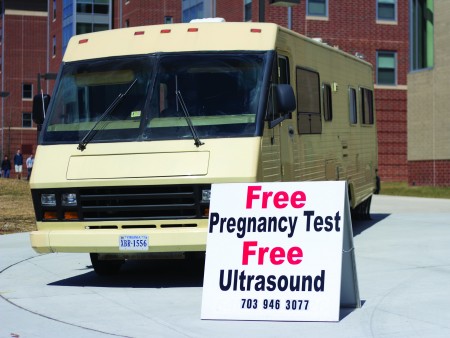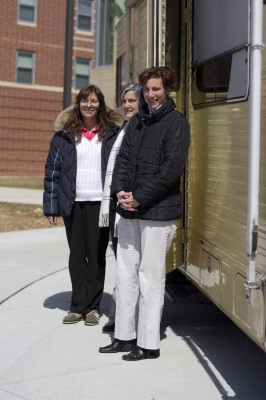Every other Wednesday, an unmarked camper RV is parked out front of Southside with a sign that advertises pregnancy tests and ultrasounds.
Inside are two women, Kirsten Ball and Angela Clarke. Clarke is a Mason alumna and executive director of the mobile ultrasound and resource center, and Ball is registered with the state as a geriatric physician who works in a general practice office and performs the ultrasounds.
The two say they are affiliated with no organization or program and are offering the services independently.
However, Hannah Krandall, scheduling manager for events management, confirmed that the RV was scheduled and reserved through the student organization, Students for Life.
In the brochure Ball and Clarke hand out to young women who use their services, there is a strong emphasis on counseling services they offer.
“The most important part of our outreach mission is in having the opportunity to talk with these women and girls who have not heard the truth about abortion and be there to listen to them,” the brochure states.
Anna Maher, president of Students for Life, said that this truth is that abortion ends the life of a human being and has negative physical, emotional and mental side effects for women.
“It is unfortunate that society says the best possible option we can give to women who are in a crisis pregnancy situation is to end the life of their child,” Maher said.
Though Clark says that the final decision about what to do regarding the pregnancy is up to the individual woman, the brochure places a strong emphasis on choosing life, and reports that 80 percent of those who see the ultrasound will choose life.
Dr. Wagida Abdalla from Student Health Services (SHS) said that ultrasounds are usually given to pregnant women after 12 weeks with the medical purpose of ensuring that the baby is a healthy size and has no abnormalities or risks.
“Ultrasound gives a woman an opportunity to bond with her baby early on and this experience encourages her to seek early prenatal care that protects both her health and the life of her preborn child,” Clark said to Maher in an email. “It’s all about reaching women where they’re at and to come alongside of them in their moment of need, offer them love and help them find hope.”
“We want to help students and give them the support they need,” Clark said. “A lot of times they’re not getting that support from the boyfriend. We’re here to be their extended family.”
The resource center travels to abortion centers, pregnancy resource centers that do not offer ultrasound imaging and universities to reach out to women and girls. In an attempt to offer more privacy, Ball and Clark hope to move the RV to a campus parking lot in the future.
“We’re just starting out,” Ball said. “We hope in time people know who we are and then they’ll seek us out when we park somewhere more discrete.”
Pregnancy tests are offered in the form of over-the-counter urine tests that are available at drug stores.
In addition to the tests and ultrasounds, Ball and Clarke refer pregnant women to community care programs for that offer resources like diapers, formula, car seats and other amenities young struggling women may need.
Doctors and nurses at Student Health Services (SHS) expressed concern over the RV, which SHS has no affiliation with. Maher said that Clark spoke with SHS to ask for permission to post flyers and distribute brochures in their office, but Dr. Abdalla and registered nurse Carol Filak had no knowledge of any conversations between A Best Choice and SHS.
“It’s not the best circumstance or place to counsel someone about pregnancy, no matter if you’re pro-choice or pro-life,” Dr. Abdalla said. “It should be done in a doctors office where full resources are available.”
SHS does not offer ultrasounds, which requires expensive machinery and training to use, to students. Pregnancy tests are available for a $10 lab fee and SHS is able to direct young women on to further resources to get prenatal care and support.
Resources on their website include shelters with and without a religious background, hospitals and abortion clinics.
Though Dr. Bell is registered with the state as a geriatric physician, whose speciality is caring for the elderly, she has received specialized training to perform ultrasounds.








Comments